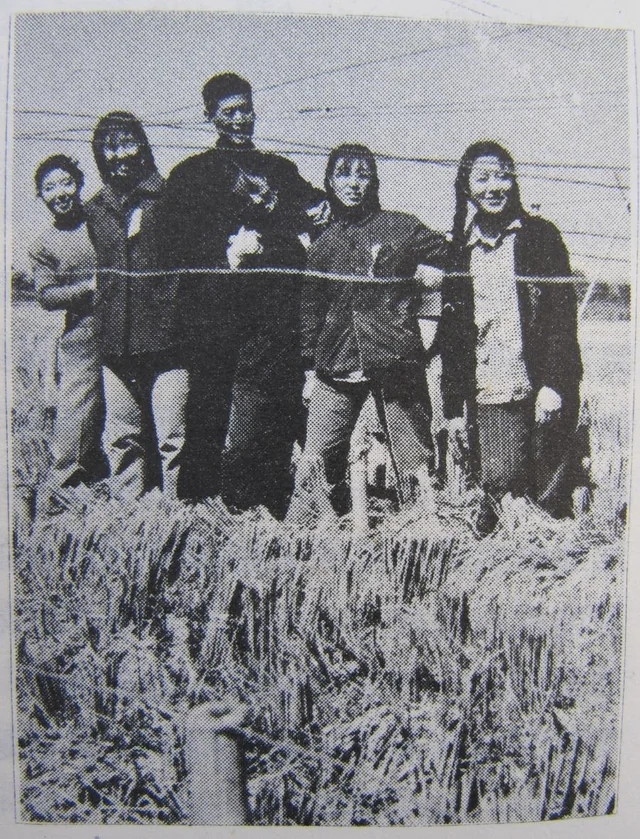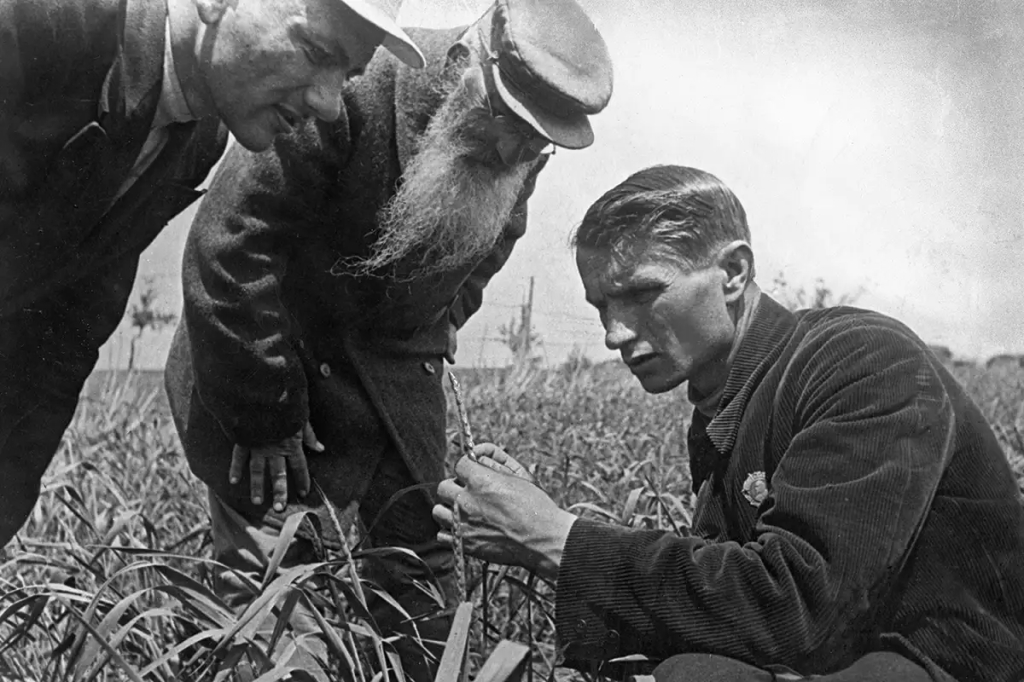Note- This will be my last post on wordpress. You can follow my weekly posts at substack instead. It is free and easy to subscribe so you get my updates via email.
Trofim Lysenko was a Ukrainian of peasant heritage who started as a research assistant in a Soviet agricultural institution, but managed to rise to a higher rank than Stalin. During the communist purges, he was instrumental in sending former mentors and colleagues into exile or execution. His theories on how to improve agricultural output were enthusiastically adopted and enforced across the newly centralised farming system, leading to disastrous results and contributing to the frequent famines that plagued the USSR. He was so opposed to the concept of genetic heredity that he theorised that any species could be rapidly transformed into any other simply by exposure to the right environmental conditions.
“Lysenkos Ghost” focuses more on the struggle between different philosophical approaches to biology in the early 20th century, while “Lysenko and the Tragedy of Soviet Science” gives a detailed account of the unfolding political machinations. Rather than summarising the contents of the books, I thought it would be more interesting to reflect on the general patterns illuminated by this fascinating time in history. Rather than being a historical aberration, I believe the dynamics of this situation represent a fairly common phenomenon, one that is happening today and is likely to happen again in a resource-constrained future.
One really interesting section in “Lysenko’s Ghost” outlined the explosion of different theories of genetics and evolution could be applied to humanity itself. Today, our awareness of eugenics at this time in history is mostly limited to the Nazi implementation of “racial purity” and to a lesser degree the widespread forced sterilisation program in the USA. It is also important to remember at this time the nature of DNA was not experimentally known, only the rules for simple Mendelian inheritance had been demonstrated in certain model organisms. Modern proposals around genetic engineering based on our current limited understanding of biology are probably just as half-baked.
In reality, there were many different proposals on how emerging scientific knowledge of heredity could be applied for the betterment of humanity, despite the lack of meaningful understanding. There was also a profound sense of panic and paranoia that one nation would get eugenics right before anyone else and claim an unassailable advantage over the world (this was the Nazi end goal). In practice, only the most politically convenient interpretations of eugenics were implemented on any meaningful scale, and almost always in scenarios where the primary motivation was desperation.
The dynamic around eugenics in the early 20th century has many parallels to the excitement around the latest round of AI technology today. The promising possibilities, the unmeasurable risks and the desperate fear of missing out and being left behind are all unmistakable. I think a similar dynamic is also unfolding for genetic engineering today, but at a slower rate and mostly behind closed doors.
Another idea that these books made me think of was cultural schismogenesis. This is the process where two groups of people in regular contact tend to shape their cultures to become distinct from each other. A good example would be the divergence between Hindus and Muslims around eating pork and beef. Catholic ornamentation versus protestant austerity would be another case.
Western scientists became fixated on the idea that good or bad genetics were inescapably inherited, meaning the existence of superior and inferior races and the benefits of preventing the inferior races from reproducing. Communists reacted to this position by promoting any biological science which denied the existence of genes and instead argued that environmental exposure changed the traits of organisms in a heritable way (as argued earlier by the biologist Lamarck). To the Communists, a perfect human society could be created by giving everyone ample resources to reach their potential. Darwinist thinking was taken up by the Nazis to emphasise the importance of competition for the selection of superior genetics. Lysenko went so far as to deny the existence of competition between members of the same species. For example, he argued that sowing multiple times the usual rate of wheat would multiply the final yield. This advice was propagated by the Chinese communists, who produced propaganda photos of wheat fields so dense they could support a child’s weight (while in reality, the child was standing on a hidden stool).
I argue that the improvements in long-distance communication at this time in history were key for driving the contrasting ideologies of the communists and the capitalists to extremes. Both groups regularly distributed enemy writing and engaged in collective critique, which encouraged ever more extreme opposing views. This dynamic likely helped push the competing value systems of the two cultural blocks further than would otherwise occur. In many ways, the insanity of both the Nazis and Communists were mirror images of each other.
This dynamic is today echoed in the basic functioning of the internet, where different cultural groups wall themselves off from each other, but widely share material from the other side repackaged into a form designed to ridicule or demonise. This pattern traces back to the rise of Tumblr and 4chan, where each side developed a cultural norm around either maximising or minimizing offence as their core cultural value. Unlike the early 20th century, these two subcultures are not geographically separated into distinct geographical nations. On the upside, it means this kind of cultural divide is less likely to precipitate something like the world wars, but it could contribute to future civil wars.
Lysenko had the fortune of being born into peasant stock at a time when the USSR was actively promoting people from the former lower classes into leadership positions. This provided him with his first taste of power, where he proved adept at charming Stalin when he was at his most powerful. Lysenko was also routinely championed by the state media as a noble peasant, elevated to the role of genius and saviour.
Without much in the way of scientific training, Lysenko made extravagant promises about how his theories would massively increase agricultural output, at a time when the forced collectivisation of farming had put the USSR on the edge of famine. The forced and premature implementation of Lysenko’s ideas made the situation worse, though it took decades before his influence diminished. When biologists with higher class backgrounds tried to criticise Lysenko they were purged- exiled, imprisoned or executed- after being accused of sabotage or being enemy agents.
This dynamic has some parallels with how the West is conducting itself today. The most interesting part is that I don’t feel inclined to point out what the details are, for fear of being cancelled. At present, this doesn’t extend as far as being executed, but reading the history of the USSR is quite chilling since the ramping of pressure on the society to the point of the purges happened suddenly and unexpectedly. People reported having dinner with long-time friends and sitting in silence, afraid to speak at all in case the other person reported them to authorities.
One thing that is most fascinating is how a supposedly scientific organisation led a supposedly rational government to make one disastrous decision after another for decades. Lysenko appears to have never done proper experiments. His underlings saw him as a kind of god and often falsified the data from his flawed research projects (likely responding to the oppressive top-down pressure to deliver solutions). Government powers seized upon his too-good-to-be-true proposals, imposed them nationwide by force before they could be tested at intermediate scales, then repeated the process multiple times despite repeated failures.
Facing limits in machinery, fertiliser and expertise, the USSR authorities had no better option than to trumpet absurd promises through their propaganda networks and suppress opposition through their secret police (the two parts of the system that were working well). This pattern reminds me of a starving person who loudly declares some berries are edible, then eats and regurgitates them out of desperation, only to eat even more the next day to save face.
A similar pattern unfolded recently in Sri Lanka. Facing a severe trade imbalance, the government imposed an overnight ban on imported chemical fertilisers and pesticides. They sold this plan to the people on the promise of higher export prices for “organic” commodities like tea, and an increase in tourism. Instead, output crashed and the economy descended into chaos.
In a resource-constrained future, authorities are likely to end up turning to promises of quick solutions, provided they are easy to sell to the citizens (ideally leveraging pre-existing cultural movements). The belief in the ability of power to provide solutions is often more important than the solutions themselves. It is likely that existing alternative agriculture movements will be harnessed for this purpose in the future as Western economies hit crisis points. While all of these techniques will be increasingly vital in the future, none of them is a drop-in alternative for industrial agriculture on the scales required.
The result will be predictable- first overpromise, then underdeliver and an eventual “debunking” of whatever alternative approach to industrial agriculture is wheeled out to placate, distract and inspire the masses. Ideally, the next solution will be wheeled out before the last one is proven to be worthless (the Elon Musk model for innovation). Plant breeding in particular is slow and unpredictable (Lysenko repeatedly promised his new methods would produce high-yielding new varieties in as little as a single year). After a decade of trialling diverse genetics, I am only barely getting started with the work on my little experimental farm. I would struggle to feed myself, let alone a nation, if I was called on to do it overnight without industrial backup systems. My semi-rural village contains around 2000 people today. If we were forced to feed ourselves I doubt the land could carry more than 400.
It is quite possible Lysenko sincerely believed he was doing good for his country.
It is also possible he was merely a socially attuned human who intuited the dangers of his era.
People are strange, and often strangers to themselves in trying times.
And we can be certain that strange and trying times lie ahead.

